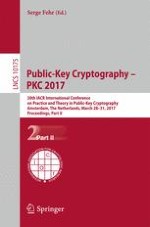2017 | OriginalPaper | Buchkapitel
Better Two-Round Adaptive Multi-party Computation
verfasst von : Ran Canetti, Oxana Poburinnaya, Muthuramakrishnan Venkitasubramaniam
Erschienen in: Public-Key Cryptography – PKC 2017
Verlag: Springer Berlin Heidelberg
Aktivieren Sie unsere intelligente Suche, um passende Fachinhalte oder Patente zu finden.
Wählen Sie Textabschnitte aus um mit Künstlicher Intelligenz passenden Patente zu finden. powered by
Markieren Sie Textabschnitte, um KI-gestützt weitere passende Inhalte zu finden. powered by
Abstract
-
Only a global (i.e., non-programmable) reference string is needed. In contrast, in GP the reference string is programmable, even in the semi-honest case.
-
Only polynomially-secure indistinguishability obfuscation for circuits and injective one way functions are assumed. In GP, sub-exponentially secure IO is assumed.
